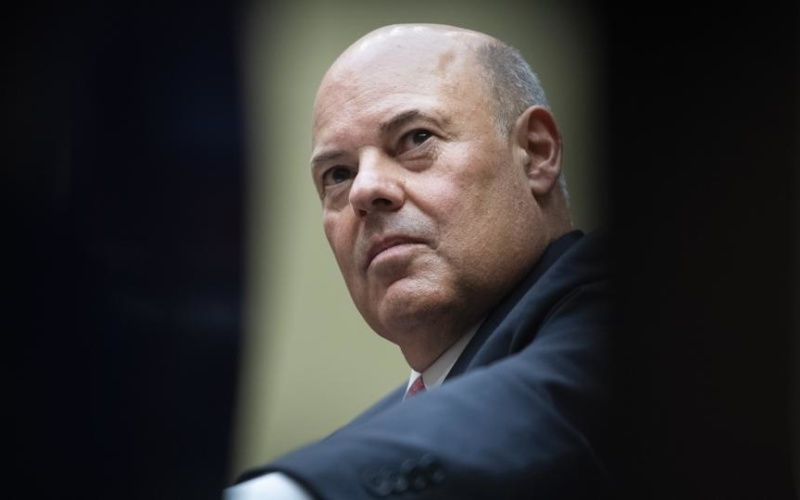Postmaster General Louis DeJoy testifies during a hearing before the House Oversight and Reform Committee, August 24, 2020 (Tom Williams/Getty)
Postmaster General Louis DeJoy may have committed a crime when, as the CEO of a North Carolina company, he allegedly reimbursed employees for contributions to Republican Party candidates.
DeJoy, appointed by Donald Trump in May, has come under fire for his severe cutbacks of the US Postal Service as Trump has tried to discredit postal voting in November’s elections.
Now The Washington Post reports from multiple sources, including DeJoy’s former head of human resources, that he pressured staff to make large campaign contributions — and gave bonuses to repay those who did.
DeJoy, a mega-donor to Trump’s 2016 Presidential campaign, built his fortune through New Breed Logistics, a supply-chain and distribution center operations company. Employees said they were urged by the CEO’s aides or DeJoy himself to write checks and attend fundraisers at DeJoy’s mansion next to a Greensboro, North Carolina country club. The events for GOP candidates for the Presidency and Congress regularly brought in more than $100,000 each.
Two employees “familiar with New Breed’s financial and payroll systems” cited DeJoy’s instruction for bonuses as repayment.
David Young, DeJoy’s longtime director of human resources, had access to payroll records from the late 1990s to 2013. He said:
[DeJoy] asked employees for money. We gave him the money, and then he reciprocated by giving us big bonuses….
No one was ever forced to [give] or lost a job because they didn’t, but if people contributed, their raises and their bonuses were bumped up to accommodate that.
Another former employee explained, “[DeJoy] would ask employees to make contributions at the same time that he would say, ‘I’ll get it back to you down the road.’”
A Felony Violation?
Employees may be encouraged to make political donations; however, reimbursement is a violation of Federal and North Carolina elections law, allowing a mega-donor such as DeJoy to evade individual contribution limits.
The “straw donor” practice can be punished as either a misdemeanor or felony. Federal violations have a five-year statute of limitations, but there is no statute of limitations in North Carolina for felonies.
North Carolina Attorney General Josh Stein tweeted, “Any credible allegations of such actions merit investigation by the appropriate state and federal authorities.”
My statement on today's @washingtonpost story "Louis DeJoy’s rise as GOP fundraiser was powered by contributions from co. workers who were later reimbursed, former employees say":
It is against the law to directly or indirectly reimburse someone for a political contribution.1/2
— Josh Stein (@JoshStein_) September 6, 2020
Between 2000 and 2014, 124 New Breed employees — many of whom had not previously made donations, and not made any after leaving the company — gave a total of more than $1 million to federal and state GOP candidates. During the same period, nine employees gave a combined $700 to Democrats.
After DeJoy retired at the end of 2015, several employees who remained with New Breed’s successor XPO gave significantly smaller donations or stopped altogether.
“Pressure on the Executives”
Former employees spoke of DeJoy and his aides sending e-mails inviting employees to fundraisers, making follow-up calls, visiting staffers’ desks.”
“He would put pressure on the executives over each of the areas to go to their employees and give contributions,” one said.
Some said they were happy to make the donations, but others said they felt they had little choice, with DeJoy’s heavy-handed demeanor and a reputation for being quick to anger.
Plant managers said they received strongly-worded messages from superiors that they should give money at fundraisers. A program manager said that when he was given his first company bonus, a New Breed vice president told him that he should buy a ticket to the next event.
Five former employees said DeJoy’s executive assistant Heather Clarke, personally called senior staffers to see if executive were coming to fundraisers and collecting checks for candidates. Joe Hauck, a company Vice President, also urged contributions, said former staff.
In a House hearing last month, DeJoy was asked by Rep. Jim Cooper if he had repaid executives for donations to the Trump campaign.
“That’s an outrageous claim, sir, and I resent it….The answer is no,” DeJoy responded.
Aug. 24, 2020
COOPER: Did you pay back several of your top executives for contributing to Trump's campaign by bonus-ing or rewarding them?
DEJOY: That's an outrageous claim, sir, and I resent it. … The answer is no. … I'm fully aware of legal campaign contributions. pic.twitter.com/3OjJK9U0on
— JM Rieger (@RiegerReport) September 6, 2020
DeJoy spokesman Monty Hagler claimed, “Mr. DeJoy was never notified by the New Breed employees referenced by the Washington Post of any pressure they might have felt to make a political contribution, and he regrets if any employee felt uncomfortable for any reason.”
Hagler did not address the issue of reimbursement, instead saying DeJoy “believes that he has always followed campaign fundraising laws and regulations”.
Hauck, the former Vice President, acknowledged approaching personnel for contributions but denied any pressure. He said he never received or was offered bonuses to make the approaches: “That’s illegal — you can’t do that.”
But plant manager Steve Moore said he was pressed just a few months into his job in 2007. His manager said a contribution to the campaing of former New York mayor Rudolph W. Giuliani, then a GOP candidate for President, was “highly recommended” even if he would not attend a fundraiser.
“I took that to mean my job is on the line here, or things won’t go smooth for me here at New Breed if I didn’t contribute,” Moore said. He donated $250, but was terminated in 2008 after a dispute with his supervisors.

